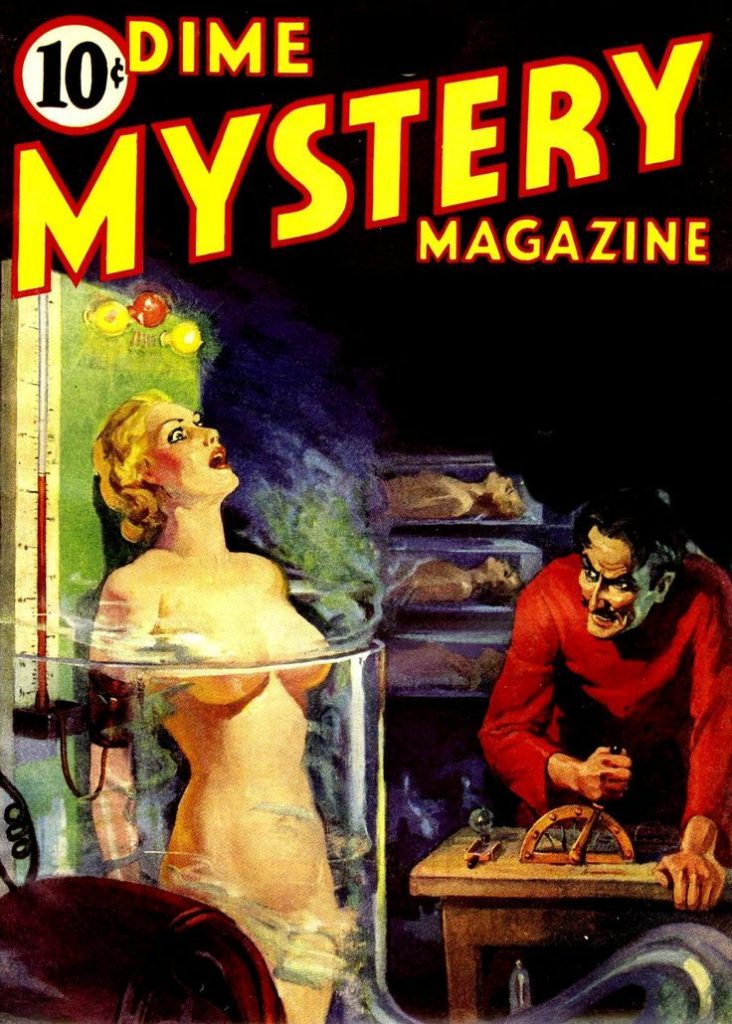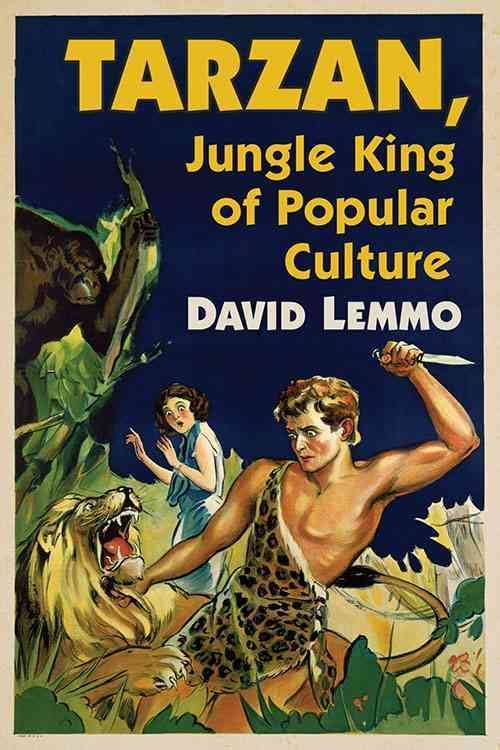SENSOR SWEEP: Juvenile Sexist Jokes, Misanthropic Loners, Deliberate Subversion, and Juicy Bits
Monday , 17, April 2017 Sensor Sweep 7 Comments Tunnels & Trolls (Save Versus All Wands) Game Review (Part 2): Tunnels & Trolls, 1st edition: Troll Talk, Character Creation and a Tasteless Joke — “I’ll take a juvenile sexist joke, or, at least, a young hobby where authors occasionally make juvenile sexist jokes in print, over the dumbed down, prudish, committee-composed, corporate, politically-correct pap that passes for ‘writing’ in, say, the current iteration of ‘the world’s most popular role-playing game,’ or the way-past-its prime mainstream hobby that it represents, any day.”
Tunnels & Trolls (Save Versus All Wands) Game Review (Part 2): Tunnels & Trolls, 1st edition: Troll Talk, Character Creation and a Tasteless Joke — “I’ll take a juvenile sexist joke, or, at least, a young hobby where authors occasionally make juvenile sexist jokes in print, over the dumbed down, prudish, committee-composed, corporate, politically-correct pap that passes for ‘writing’ in, say, the current iteration of ‘the world’s most popular role-playing game,’ or the way-past-its prime mainstream hobby that it represents, any day.”
Regress Harder! (Rawle Nyanzi) A Sudden Rescue of Male-Female Polarity — “This right here is golden; modern speculative fiction simply does not portray it anymore. Such tropes are blasted as outdated relics from a backward time, failing to affirm equality between men and women. Yet when these allegedly retrograde tropes play out, the story feels right. It feels nice. It feels satisfying.”
Genre Wars (Benjamin Cheah) Can post-cyberpunk fiction be superversive? — “Readers need to empathise with characters. Actions should not entirely be in vain. Evil is punished, good prevails, civilisation endures or evolves. Without these elements, it becomes exceedingly hard for a reader to care. Why should a reader care about a self-destructive misanthropic loner who remains a self-destructive misanthropic loner? Why should a reader be concerned about the fate of an oppressive dystopia? Why should a reader cheer on a traitor, a liar or a murderer with no redeeming traits? With such societies and characters, it takes great skill to hook a reader and keep him invested in the story — a skill few cyberpunk writers, if any, have. Indeed, it is telling that the authors once associated with cyberpunk no longer write cyberpunk.”
Anime (Benjamin Cheah) Retrospective: Ghost in the Shell (1995) — “Manga Section 9 comes off as a unit of cowboys just a few steps away from being loose cannons, who have no qualms turning their skills on their allies and superiors on a whim, and only slightly more skilled than the criminals they face. Anime Section 9 is an elite group of operators who take the time to ponder their humanity.”
Pulp Revolution (The Pulp Archivist) Influencing People Without Making Friends — “Since the birth of the movement, I have seen Superversive writers and critics hold up previous works of deliberate Subversion as examples for today’s writers to emulate. Superversive writers have dug their heels in to defend the Campbellian Revolution from criticism, despite the fact that Campbell’s reign was the Golden Age of Subversion and a Golden Age of Despair. And the Superversive collection Forbidden Thoughts was unironically tailored after Dangerous Visions, an unapologetic work of Subversion with a capital ‘S’. It is this hypocrisy that mars the otherwise appealing Superversive movement. At the very least, the standards of Superversion do not appear to be applied rigorously in the critical sense at the present, and not at all when nostalgia is invoked. At worst, the current standard of Superversive is fundamentally flawed, and unable to distinguish between subversion and superversion.”
 D&D (The Last Redoubt) How Different Is It? — “While, in my youth, I leapt to AD&D and never looked back, I agree that something was lost in the quest for completeness, and consistency. If I had to chose between my childhood systems of D&D it would be AD&D in a heartbeat. That said, I’m not sure that, at least as shown in ACKs, going back to the same roots hasn’t resulted in at least some better stuff. Yes, Pathfinder has certainly worn on me with its bloat and shallow breadth, but the additions to ACKS actually change the nature and depth and core rules of the game – yet you can take them or leave them as you wish.”
D&D (The Last Redoubt) How Different Is It? — “While, in my youth, I leapt to AD&D and never looked back, I agree that something was lost in the quest for completeness, and consistency. If I had to chose between my childhood systems of D&D it would be AD&D in a heartbeat. That said, I’m not sure that, at least as shown in ACKs, going back to the same roots hasn’t resulted in at least some better stuff. Yes, Pathfinder has certainly worn on me with its bloat and shallow breadth, but the additions to ACKS actually change the nature and depth and core rules of the game – yet you can take them or leave them as you wish.”
Comics (The Federalist) Forcing Political Correctness On Employees And Characters Is Killing Marvel Comics — “Marvel has writers who profess to be atheist, Jewish, and they even have a Muslim writer. Most writers, eager to speak out on their left-wing politics, don’t talk about their religion at all. I did find one oddity: out of the entire group, I did not find one writer that openly professed Christianity. On the contrary, many of the writers made comments mocking Christians or the Bible.”
D&D (Autarch) Thievery Corporation — “Thieves in ACKS and other d20 retro-clones tend to be much less bold, because they are harshly penalized for failure, and fail quite often. For instance, a thief in ACKS a thief may only try to pick a particular lock, or find and remove a particular trap, once. If he fails, he may not try the same lock or trap again until he reaches a higher experience level.”
Role-playing Games (Walker’s Retreat) My Life as a Gamer: Y’know, Braunstein Damn Near Nailed All You Need In Tabletop RPGs — “That’s the core of tabletop RPG gameplay. The back-and-forth between the participants, revolving around the fundamental feedback loop of ‘What do you do?’ No player, ever, needs to know a [gosh darned] thing other than that. The Game Master doesn’t need to know much more anymore, which will make those of you wondering what the role of RPG designers are ask ‘Well, what do I do?'”
Appendix N (Grogheads) GrogHeads Reviews Appendix N — “The other goal of Appendix N is even more interesting. Jeffro Johnson thinks that current fantasy writers lack the power, impact and clarity of the pulp sword and sorcery writers of earlier decades. He also believes that many of these source books provide excellent hooks and inspiration for modern D&D and other role playing adventures. Mr. Johnson had not read a number of these authors prior to his project and he became a big fan of many of the adventure pulp writers and fantasy writers of the 1970s as a result.”
Books (Injustice Gamer) Injustice Quick Reviews 2.5 — “Schrodinger’s Gat by Robert Kroese- If you’re expecting another comic sff story from the guy that might just be the funniest man in sff, forget it. This book is dead serious, and delves into physics, philosophy, and metaphysics, all with a touch of what might be noir. Major crime: The idea that there are things we shouldn’t know.”
 I Know it When I See It (Misha Burnett) Juicy Bits — “As part of the on-going discussion regarding the nature of speculative fiction and how changes in the dominant publishing paradigm are allowing for more latitude and innovation in narrative structures, I engaged in a conversation regarding the nature of ‘Pulp’–specifically, what is ‘Pulp’ and what is ‘non-Pulp.’ I mentioned this conversation to my roommate who replied, ‘Oh, that’s easy–pulp has juicy bits.'”
I Know it When I See It (Misha Burnett) Juicy Bits — “As part of the on-going discussion regarding the nature of speculative fiction and how changes in the dominant publishing paradigm are allowing for more latitude and innovation in narrative structures, I engaged in a conversation regarding the nature of ‘Pulp’–specifically, what is ‘Pulp’ and what is ‘non-Pulp.’ I mentioned this conversation to my roommate who replied, ‘Oh, that’s easy–pulp has juicy bits.'”
Okay Sure Whatever (Black Gate) Cover to Cover — “Until relatively recently, I never looked at cover art.”
Why Didn’t Anyone Tell Me? (Into the Night) Appendix N Challenge: The Sword of Rhiannon by Leigh Brackett. — “Everything is so clearly written that it is literally a joy to read. I can honestly say that I will be reading everything of Brackett’s that I can find. And, seeing as how I can’t watch this on the big screen, I’ll be watching El Dorado instead. Apparently, it’s the one with John Wayne, and not the animated one. Who knew?”
Tunnels & Trolls (Save Versus All Wands) Game Review (Part 6): Tunnels & Trolls, 1st edition: Rogues — “But St. Andre went, as it were, full organic, including no explicit thief skills for rogues. Rather they were, simply, half warriors and half magic-users. This never occurred to me, but it should have. Among other things, it was actually more faithful to the archetypes, indeed, it fairly closely tracked, the abilities of the Gray Mouser and Cugel. But then, what made them rogues? St. Andre also built that in. Among other things, while rogues could use magic, the wizards guild was too snobby to give them any spells. So they had to buy them from ‘legitimate’ magic-users, or perhaps finagle them in some other, probably roguish, way. Undoubtedly, that embittered them and encouraged their questionable tendencies.”
Traveller (Den of the Lizard King) On the Beauty of Classic Traveller — “The beauty of Classic Traveller is that a few digits define a world, and are enough to infer much from them, all while allowing for much nuances and for an endless variety of worlds. The stats suit adventurers and their needs – What starport services are available? Can I take my laser rifle ashore? Which politics will I have to deal with? Can I breath the air? Can I refuel from oceans/gas-giants/glaciers? All of this is very quick to generate and very fun to infer from.”
Pulp Revolution (Barbarian Book Club) Joining the Pulp Revolution with Storyhack Action & Adventure Issue 0! — “Revolution is growing, becoming an unstoppable force. Every week a new anthology, magazine, or independent work gets published, while social media is chock full of fascinating genre discussion. For the first time in forever, I’m energized and motivated to read and write, trying my best to keep up with each requested submission. It is a great time for SFF!”
Comics (Comics Madness) Mustache match — “Obviously for serial fiction reasons, Drac can’t succeed and yet he can’t be beaten. Insofar as he needs to be impressive and interesting, this forces the nominal heroes to be hapless and always-unsuccessful. The first couple of years struggle with it: the initial line-up of vampire hunters falls pretty flat and Drac’s mockery of their efforts can get some reader-sympathy. The situation improves by adding bad-assery and wry humor with the unquestionably outtasight Blade, the first-of-his-kind hard-boiled vamp detective Hannibal King, and the surprisingly tolerable Harold H. Harold. I have to say, Rachel van Helsing, Frank Drake, and Quincy Harker never do manage to make it as credible protagonists, but they become less important most of the time.”
I’d say that highest rating on those horror and romance scales can be just as damaging, depending on story. Insistence on hopelessness and inevitable destruction can turn your horror into predictable nihilism-porn.
Take Michael Shea’s famous and endlessly reprinted “Autopsy”. For 99% of its length it is bleak, disgusting and dehumanising. And yet, in the end, it doesn’t reach fifth scale of horrorness. And it is that fact that made it all the more memorable and impactful, that elevated it above mere splatterpunk, fact that after all that dehumanisation it ends with human self sacrifice and triumph over evil.
-
We lost Shea way too soon. From what I hear, he was a great guy and an American original. Not to mention, an excellent writer whom even Jack Vance respected.
-
That we did, and that he was. Towards the end, he was actually moving back to writing distinctly Vancian fantasy yarns.
-
Aye. Majestic wordsmith with remarkably broad range.
-
The ToD characters were all workable, but the problem was that they never were allowed to learn from their mistakes. Rachel kept trying to shoot Dracula with her crossbow only to miss because he turned into mist (making fun of her yet again), Frank was always sort of whiny, and with Quincy there’s only so much you can do with a guy stuck in a wheelchair, even if it’s loaded with weapons.
I’m not quite sure about declaring post-cyberpunk as something superior to even cyberpunk.
As in, it feels like ticking boxes. Superversive goes here, subversive goes there, therefore this is good, this is bad and, by the way, that’s why bad things aren’t continued.
On a tangent, how superversive it is for the protagonist to gallantly and valiantly defend a flawed state machine?
If the state is doomed and clearly on its way out, does it change anything? Is it more chivalrous to defend a political entity that’s dying, trying to prolong its life for a bit more and not for the personal gain?
Pohl Anderson’s Flandry novels will do as a starter for the latter, the former is your average good spy novel (let’s keep it clean and avoid the red herring of atrocities thrown in for the grit in some books).
Back to the cyberpunk.
80s cyberpunk was a computer fantasy.
90s cyberpunk was a corporate realism.
Imagine if HTC, LG, Sony and Xiaomi started producing magic wands and spellbooks (I’m jumping 20 years forward to not to evoke long-forgotten names).
That would have a most profound impact on the fantasy genre.
While magic is something you could make up because it doesn’t really exist, it’s one thing.
But when in real life there are three competing magic standards, wallets have arcane protections from telekinetic pickpocketing and the brightest and smartest are studying sanskrit, well, your imagination is shaped by that, consciously or not.
You could say that cyberpunk should be written using a typewriter.
Anyway, a realistic urban setting means that the hero can’t do anything alone, because that’s not “how it works in real life”.
Thus, a lone wolf, mercenary, hacker and terrorist transformed into a police or a paramilitary officer, to stay on the low-life fringes of the high-tech life and still to be able to do something.
So it goes.
If nothing else, examples like that of Marvel mean that people will stop believing that these corporations will change their direction once they’ve suffered severe financial impacts. They won’t, they never will. Profit is not their primary goal anymore, as they’re ideological operations first and foremost.
